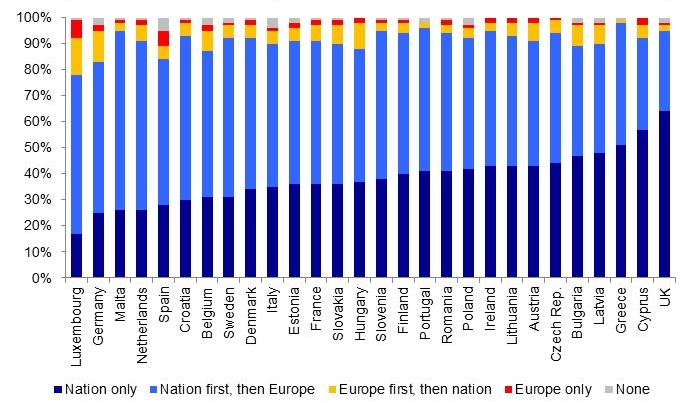
 Xenophobia, austerity, and dissatisfaction with politics may have contributed to the Brexit vote. But James Dennison and Noah Carl write that, although a number of concerns may have tipped the balance, Brexit was ultimately decided by more than recent events. Here, they demonstrate how the UK has been the least well-integrated EU member state. The closer the EU was moving toward political union, the more likely Brexit became.
Xenophobia, austerity, and dissatisfaction with politics may have contributed to the Brexit vote. But James Dennison and Noah Carl write that, although a number of concerns may have tipped the balance, Brexit was ultimately decided by more than recent events. Here, they demonstrate how the UK has been the least well-integrated EU member state. The closer the EU was moving toward political union, the more likely Brexit became.
Since the British electorate voted to leave the European Union on 23 June, many commentators have sought to explain (and often decry) the referendum’s outcome as the result of a misleading and demagogic Leave campaign, irrational xenophobia, simple racism, an obstinate protest vote, the government’s fiscal austerity policies, a largely Eurosceptic press, or general discontent about the economy. While several of these explanations have at least some merit, we believe they are insufficient to explain the outcome of the referendum. Indeed, in our opinion, they either put too much emphasis on recent events, or mistakenly assume that few Leave voters were motivated by dissatisfaction with Britain’s EU membership per se.
Regarding the former, a recent analysis of internet and phone polls suggests that Leave may actually have had the lead throughout the entire campaign, belying the claim that provocative statements made by Nigel Farage or Boris Johnson exerted decisive sway over prospective voters. Regarding the latter, evidence from the BES internet panel and Lord Ashcroft’s large post-referendum poll suggests that overall national sovereignty may have been just as important an issue for Leave voters as immigration, and that austerity hardly registered.

Opposition to Britain’s membership of the EU has fluctuated over the years, but has remained substantial ever since the UK joined in the mid 1970s; somewhere between ~30 and ~60% of the British public has always been opposed to EU membership. Of course, the Eurosceptic fraction of the population almost certainly increased as a consequence of the rapid rise in EU immigration, which began in the late 1990s, and the Eurozone debt crises, which precipitated mass unemployment across Southern Europe. Nevertheless, the most important phenomenon to be explained vis-à-vis the referendum result in our view is that a sizeable Eurosceptic faction has remained extant in Britain over the last four decades, in contrast to the other countries of Europe.
In The American Voter, one of the seminal studies on voting behaviour, Angus Campbell arranged the myriad factors affecting vote choice within a so-called funnel of causality: ultimate causes––such as structural and historical factors––were placed on the left-hand side of the diagram, while proximate causes––such as attitudes to individual policies and candidates––were placed on the right-hand side. We proceed by showing that, in a number of important respects, the UK is the least well-integrated EU member state––essentially, the least European country in the EU––and that this fact likely stems from certain historical features of the UK, which arguably constitute the ultimate causes of Brexit.
Figure 1 shows national versus European identification for all 28 EU member states. The UK is ranked 28 out of 28 for European identity: nearly two-thirds of Britons do not identify as European at all, compared to fewer than 40% of French and Italians, and fewer than 30% of Spanish and Germans.
Figure 1. National versus European identification, 2015. Source: Eurobarometer survey.
Figure 2 shows trust in the European Union for all 28 EU member states. The UK is ranked 26 out of 28: fewer than 30% of Britons trust the EU, compared to 39% of Germans, 47% of Dutch and a full 57% of Danes.
Figure 2. Trust in the European Union, 2015. Source: Eurobarometer survey.
Figure 3 shows percentage of emigrants living intside the EU for all 28 EU member states. The UK is ranked 28 out of 28, and by a non-trivial margin. Indeed, according to the latest UN data, there are more Britons living in Australia than there are in all 27 other EU countries combined.
Figure 3. Percentage of emigrants living inside the EU, 2015. Source: United Nations Population Division.
Figure 4 shows percentages of imports from the EU and exports to the EU for all 28 EU member states. The UK is ranked 27 out of 28 for imports, and is ranked 28 out of 28 for exports.
Figure 4. Percentages of imports from the EU and exports to the EU. Source: Eurostat.
Finally, Figure 5 shows percentages of FDI instock from the EU and FDI outstock to the EU for all 28 EU member states. The UK is ranked 27 out of 28 on FDI instock, and is ranked 25 out of 28 on FDI outstock.
Figure 5. Percentages of FDI instock from the EU and FDI outstock to the EU, 2012. Source: United Nations Conference on Trade and Development.
As the above charts illustrate, the UK’s comparatively limited integration into the EU is manifested in citizens’ self-identity, in their mistrust of the EU, in patterns of emigration, in international trade flows, and in foreign investment allocations. While the UK is not the lowest-ranked country on every single measure, it consistently ranks among the bottom two or three; the only countries that come close are Greece and Cyprus––both of which have suffered financial crisis in recent years.
Britons’ comparatively less European self-identity and lower trust in the EU may have come about for the following reasons. First, Britain is the only allied European power not to have been occupied during World War Two. Second, Britain has its own common law legal system, which contrasts with the civil law legal system of continental Europe. Third, because Britain has an established church, most British Christians have historically owed their allegiance to a national institution headed by the monarch, rather than to an international institution headed by the Pope. Fourth, Britain is an island whose surrounding waters have partially isolated it from cultural developments on the continent.
The fact that Britain’ does relatively more of its trade and investment outside of the EU is due at least partly to the size and economic development of its former empire, the status of English as the global business language, and its particularly close ties with the United States. All of these factors have served to stymie over-enthusiastically pro-EU business policy, exemplified most clearly in the previous Labour government’s decision to not join the Euro. In addition, Britain’s colonial past surely explains why relatively fewer of its emigrants choose to resettle in the EU. Indeed, several former British territories today have large British-descended populations
In conclusion, Britain is the least well-integrated EU Member State: European, just not European enough. While short-term contingencies and concerns about other issues may have tipped the balance toward Leave, we believe that, as the EU moved closer toward political union, the UK’s fundamentally less European character meant that Brexit was increasingly likely.
This article first appeared on the BPP blog and it gives the views of the author, and not the position of BrexitVote, nor of the London School of Economics. Image credit.
James Dennison is a Researcher at the European University Institute in Florence. His work focuses on political participation. He is the author of The Greens in British Politics and tweets @JamesRDennison
Noah Carl is a doctoral candidate in the Sociology department at the University of Oxford. His research focuses on the correlates of beliefs and attitudes and he is an editor and contributor at the demography blog OpenPop.












For the Brexit blog this an unusually sane and unbiased posting. It is also persuasive. Certainly when I founded the AFL in 1991 (UKIP from 1993) its aim was the re-establishment of British parliamentary self-government and national sovereignty. Immigration was never mentioned. Nor did we have ahy nostalgia for empire. The aim of the Bruges Group which I co-founded in 1989 was the same.
The authors might have added that the UK was a reluctant and late, not to mention unsuccessful, member of the ERM and was never party to the Schengen Agreement. They do mention that we did not join the euro. Thus we were at best only a semi-detached member of the EU before the referendum.
Also relevant of course is that until EU immigration became noticeable fairly recently, the EU did not impinge on the lives of ordinary citizens. It did not run schools, hospitals, care-homes or build roads or houses. So most voters paid little attention to it. Yet, as mass EU immigration began to affect all these areas, ordinary voters felt affected after all. This,not xenophobia or racism, exacerbated the original feeling that British self-government needed to be restored.
A minor point; the established church is the Church of England. Wales, Scotland and N Ireland do not have established churches.
More generally, what is the difference between ‘British’ and ‘English’? I have the feeling that for many people in England, ‘Britain’ means ‘England’ and only ‘England’, and vice-versa.
The Church of Scotland is the established church in Scotland. I think there is also an established church in Northern Iteland with its own primate.
Great Britain equals England, Scotland and Wales. The U.K. Is the United Kingdom of Great Britain and Northern Ireland. Some English people may indeed be as confused as Kornhomme.
The Church in Wales and the Church of Ireland are both Anglican; the Church in Scotland is Presbyterian.
The Church of England is “by law established”; the archbishops of Canterbury and York, the Bishops of Winchester, London and Durham and the 21 most senior bishops all sit as of right in Parliament, in the House of Lords – they are the “Lords Spiritual”. No other church in the UK has clerics who have a similar right.
The Church of Ireland was disestablished in the 1870s.
The Kirk however is Scotland’s national church.
True; but it is not established. Church of England clerics are barred from being MPs (because of the representation in the Lords). This doesn’t apply to ministers of the Church of Scotland etc who may stand as candidates.
A “national” Church isn’t the same as an “established” one, where the monarch is head of the Church, and where she (he) appoints the Archbishops etc (though in practice the Prime Minister recommends a candidate).
True but you are straying from the original point by being pedantic. The authors of the posting referred to the fact that the established church was a national institution rather than an international one hence Brits were less disposed to feel European. That goes equally for the national church in Scotland.